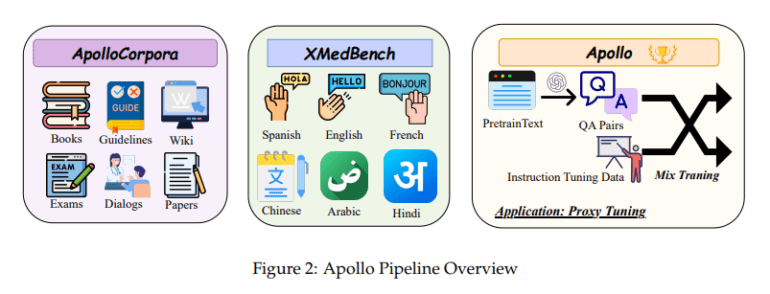- Apollo introduces open-source multilingual medical LLMs for global healthcare.
- These LLMs aim to enhance diagnosis, treatment, and access to medical knowledge.
- Addressing linguistic diversity, Apollo targets over 6 billion non-English speakers.
- Apollo surpasses existing models in multiple languages, ensuring versatility.
- The methodology involves transforming corpora, adaptive sampling, and proxy tuning.
- Apollo-7B sets new performance benchmarks in multilingual medical AI.
Main AI News:
In the fast-paced realm of medical artificial intelligence (AI), leveraging large language models (LLMs) holds immense promise for reshaping healthcare delivery. These technological strides are poised to refine diagnostic accuracy, tailor treatment protocols, and democratize access to comprehensive medical insights, thereby revolutionizing patient care dynamics. The integration of AI into healthcare services not only streamlines operational efficiency but also fosters a patient-centric approach, bridging the gap between technology and personalized care.
The linguistic diversity inherent in patient care worldwide poses a significant hurdle in the realm of global healthcare. While medical knowledge predominantly resides in English, delivering effective healthcare in non-English-speaking regions hinges upon the availability of medical resources in local languages. This underscores the urgent imperative of ensuring universal accessibility to medical AI innovations, extending their benefits to the vast and diverse global population of over 6 billion individuals.
Traditionally, the development of medical LLMs has centered on English, with limited attention to other languages such as Chinese. However, this narrow focus neglects the linguistic richness of the global medical community, necessitating the creation of LLMs capable of comprehending and generating medical insights across diverse languages. Such multilingual models are pivotal in broadening the scope of medical AI applications, fostering inclusivity, and expanding global accessibility.
Enter Apollo, an innovative suite of multilingual medical LLMs introduced by researchers from the Shenzhen Research Institute of Big Data and The Chinese University of Hong Kong, Shenzhen. Leveraging the extensive ApolloCorpora dataset and rigorous evaluation against the XMedBench benchmark, Apollo represents a significant advancement in inclusive medical AI. This groundbreaking approach enables Apollo to achieve or surpass the performance of existing models across various languages, including English, Chinese, French, Spanish, Arabic, and Hindi, showcasing unparalleled versatility and efficacy.
The methodology underpinning Apollo’s development involves transforming pre-training corpora into a question-and-answer format and implementing adaptive sampling of training data. This strategic framework facilitates seamless learning transitions, empowering the training of compact yet highly effective models. These models excel not only in comprehending and generating multilingual medical content but also in augmenting the capabilities of larger models through innovative proxy tuning methods, eliminating the need for direct fine-tuning.
Notably, Apollo’s flagship model, the Apollo-7B, has achieved remarkable performance milestones, setting new benchmarks in multilingual medical LLMs. This achievement underscores Apollo’s potential to democratize medical AI, breaking down linguistic barriers and facilitating access to cutting-edge medical knowledge worldwide. Moreover, Apollo significantly enhances the multilingual medical capabilities of broader LLMs, highlighting its pivotal role in driving the widespread adoption of medical AI technologies on a global scale.
Conclusion:
The introduction of Apollo’s Multilingual Medical AI represents a significant milestone in the healthcare market. By addressing the linguistic diversity inherent in global healthcare delivery, Apollo not only enhances patient care but also opens up vast opportunities for market expansion. With its unparalleled versatility and groundbreaking performance, Apollo has the potential to revolutionize the accessibility and efficacy of medical AI technologies, driving significant market growth and fostering inclusivity on a global scale.

